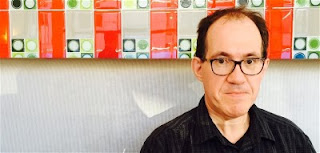THE PATH PAVED WITH…
Perhaps as a result of the aging process, or as a vain attempt at better understanding myself and my family, I began to do an ancestry search some years ago. It progressed slowly as we were a humble family seldom noted in history. Additionally, we were poor, and until my own generation (myself excluded) not generally educated beyond high school...if that. In other words, we didn't write down much stuff other than grocery lists. That's not to say we couldn't be interesting, as in the case of Jimmy Don of whom I wrote of a short while ago, but by and large we were not a well documented tribe. I set out to change this, and therein lies the tale--a tale of stunning twists and turns and crackerjack sleuthing by yours truly. No crime was committed in the writing of this blog, but you may find it instructive if you ever want to tackle the writing of a mystery tale that hinges on DNA and family history.

Enlisting the aid of my favorite cousin who represented the 'Bama branch of the family, we began to hunt down what clues and tidbits that we could. Fortuitously, she also discovered a great aunt who had kept a fairly detailed family history since she was young and this turned out to be quite a treasure trove of information; much of which could be borne out through various county records. Voila! Just like that, we had ourselves some good ol' family history going back to 'round 1780! Booyah! Naturally, having had a little bite of the forbidden apple, I decided I'd take another nibble or two. And since we couldn't seem to get any further back I hit upon another avenue of exploration---DNA!
We had already started to use DNA technology within my police department at that point, so it just made sense to me to examine its other uses. So, through the wonders of the Internet (copyright Al Gore) I made contact with a reputable firm in Texas who specialized in this sort of thing; paid my money; provided saliva samples, and sat down to wait. It didn't take long.
PUZZLING RESULTS
The results showed that my DNA didn't match any other person by the name of Dean who had submitted their own DNA results. There were a lot of Deans scattered across a lot of places; many of whom discovered connections to one another through common, and sometime distant-in-time ancestors...but, not me...not even close. Additionally, my Haplogroup (J2...more on this later) was unique to the entire army of people bearing the same name as myself! What ho? I liked the idea of being special, but this was making me uncomfortable. What could it all mean?
There's a lot to learn about DNA as it applies to family research, and I'm probably not the guy to be teaching it, but for the sake of this blog I'm gonna try. Firstly, you already know that every individual carries his own unique strands of DNA molecules that make him or her...well, him or her. DNA science has become exacting to the nth degree, which is great for forensics. That part is easy--you're you and no one else. The tougher question, at least in my case, is from whom do you descend?
In the short term the answer is usually easy; especially if you know your parents, grandparents, etc...you will share not only physically observable traits, but also repeating strands of DNA that can only have been inherited through the male line. This is Y-DNA. Things get a little more difficult the further back you go, because it is unlikely Great-Grandpa Absalom left behind any usable DNA samples and you have to take it on faith that he was who you thought he was. Sometimes there can be surprises.

There is also a little thing called Haplogroups that I mentioned earlier. Haplogroups are genetic divisions within the greater family of man that help to determine the geographic origins and time lines of their bearers. They result from genetic mutations that occur naturally over time within a male line and result in a different group, or sub-clade as they are called, being created. For instance, my Haplogroup, J2, derived from the broader J group, and is believed to have originated along the Fertile Crescent that lies between the Nile and Tigris-Euphrates rivers. You read that right. I don't look much like someone from that region, but it's been awhile...25,000 years, or so. You change.
Almost all of the Deans that had registered our surname bore Haplogroups more commonly associated with European ethnic groups. Mine, clearly, did not. Yet, our family history, such as it was, indicated pretty strongly that we had arrived in North America during the 1700's from somewhere in Britain. After I got up off the floor, I resumed searching.
WAIT...I MAY BE RELATED TO WHO?
Going back to the site provided by my DNA research lab, I looked for Y-DNA matches under
any name. Surprise! Surprise! There was one match and several close matches. The name Forrester of South Carolina was the exact match--a name with which I was unacquainted. Yet, our family history had us coming to Georgia shortly before the Civil War from...
South Carolina. Me and this fellow, whose first name I will refrain from revealing for privacy reasons, shared a common male ancestor within, at least, twenty generations, possibly much less. So how'd we get different names? And why?
I can leave to your imagination one possibility...but there are others. Firstly, surnames didn't come into common usage until the 1200's and when they did, the same family, for many reasons, might choose different surnames. For, instance, many Scots changed their names when their clan, or sept, became outlawed by the crown. Two brothers living on opposite sides of the mountain might choose different surnames just because they weren't on speaking terms...so forth and so on. As it turned out, a search of surnames through various sites revealed that a plurality of Deans, and Forresters, lived along the English/Scottish border at least as far back as the 1600's; the Dean name being concentrated in Lancashire and York counties in England and Larnarkshire county in Scotland--an overall and contiguous area less the size of New Jersey.
Yes, this panned out with our family history alright, but I had no way of proving we were in any way related to the Deans, or Forresters, of that region. Besides...we were J2's, remember...the Fertile Crescent? More research needed.
FROM WHERE...?
As I mentioned earlier, Haplogroups continue to subdivide down through the ages into various subclades. Hence, my sample was further tested for more specificity revealing that I was a J2a4b. How's that help, you may ask? Well, it brings my timeline up a few years to about 2,000 years ago, give or take, a thousand, and pinpoints the geographic origin just a little better. It appears that the mutating progenitor in this case lived in, or around, the Caucasus region comprising Georgia (the country), southern Russia, Azerbaijan, and northern Turkey. That cleared everything right up.

Firstly, I thought it was kind of amusing that my people might have come from Georgia to Georgia. Secondly, I thought, how in the hell did we get from Central Asia to North America? And if the family history is true, why did we stop off in Britain for a few hundred years...or did we?
The sad truth is that I will probably never know. There is almost no way to ascertain the facts that would be needed to retrace that ancient migration. But, there is history from which plausible theories can be postulated.
As most of you probably already know, the Caucasus served as a gateway for mass migrations of peoples from Central Asia into Europe, and these were being recorded by historians hundreds of years BCE. One of these vast tribes, the Sarmatians, inhabited the Pontic-Caspian Steppe (which extends into the Caucasus region) for a few hundred years prior to pushing westward into Eastern Europe. It appears this move was not popular with the Romans who forthwith set out to prevent them from crossing that great barrier against the barbarians called the Danube, and after a number of wars, the Romans, under Emperor Marcus Aurelius (of 'Gladiator' fame), inflicted a final and devastating defeat on the Sarmatians in 174 AD. Under the terms of surrender he demanded the submission of 8,000 cavalrymen to act as auxiliary troops to his legions already manning Hadrian's Wall in Northern Britain. Not surprisingly, the Sarmatians agreed. The ruins of the fort to which they were assigned still exist today in Ribchester, Lancashire County, England--smack dab in Dean/Forrester territory. Are the Deans descended from one of these horsemen?...God only knows. I do know that I've never gotten on very well with horses.
 |
| Sarmatians as depicted on Trajan's column |
CASE OPEN PENDING FURTHER INFORMATION
So, as you can see, my investigation into my family history created more questions than answers. The Hadrian theory is only one of many possibilities--a Sarmatian tribe known as the Alans also made their way into Central and Western Europe during the course of the early dark ages and settled in France. Some of their descendants even made their way to England with William the Conqueror; so that's another. I'm sure there are many, many other possible explanations. Hell, I'm still trying to wrap my mind around the Dean/Forrester relationship. It could be as simple as some wandering J2a4b caught a boat to South Carolina and took the name Dean after arrival. Like I said...who the hell knows?
So I may have exaggerated when I remarked on my crackerjack sleuthing, as I didn't exactly crack the case of the Dean mystery, but I did stumble upon a yet greater Mystery; hinting at a greater truth--I went from being sure of my place in the world as one certain thing, to arrive at a wholly different understanding of my humanity. Though DNA demonstrates rather conclusively how wonderfully unique each individual is; it also serves to remind us of our commonality, our shared journey. Just think how astounding each of our stories are, stretching back into the mists of time, an unbroken string of ancestors leading back to the genetic Adam and Eve from which we all descend--a million unwritten stories.





















